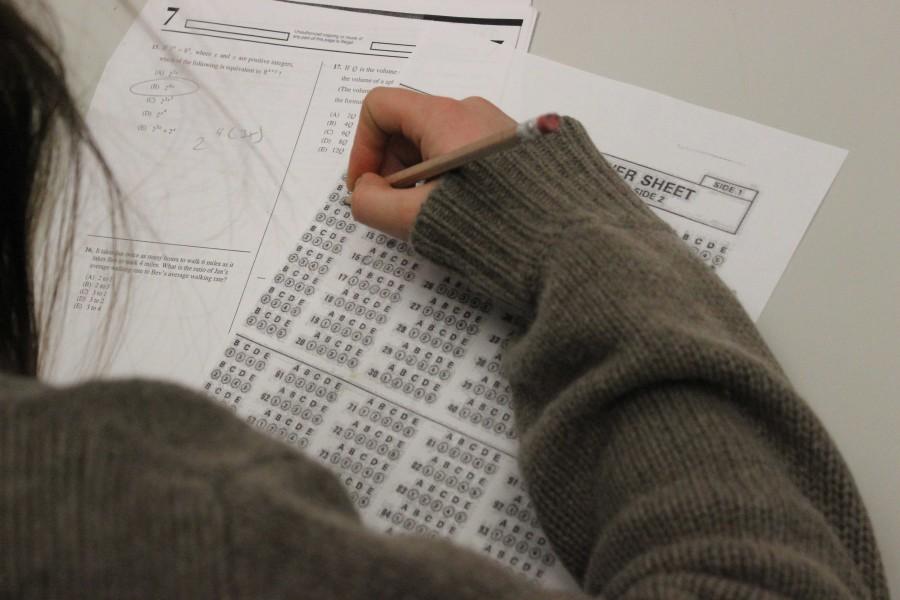It’s time to put less stress on SAT scores
March 4, 2016
A formation of desks fills the room, and all you can see are the hunched backs of other students. Fidgeting with your pencil, you anxiously reread the seemingly unanswerable question again, and again, and again. Five minutes are left, but you still have far more than five problems to solve. You read the passage again to answer a few questions that you skimmed over, but there are far too many. Two minutes. With every passing second, the visualization of going to your “dream school” becomes less realistic, as you know the score you’ll get in a few weeks isn’t up to standards. One minute. You immediately bubble in letters, praying that some of the random answers will improve your score but—
“Everybody please put your pencils down, this section of the test is over,” the proctor says.
To many high school students, their SAT score is the single most important number they will receive in their life. Not only does it act as a determinant of one’s acceptance to a prestigious university, but also indirectly plays a pivotal role in one’s future. Unfortunately for high school students now, colleges have heightened the standards for acceptance due to increased emphasis on a college education in recent decades. Although this motivates students to strive for more, it mostly leads to immense stress over a three- or four-digit number amongst other things. This, however, this cannot continue to be our reality, because there is always more to a person than one test score. Therefore, SATs, or standardized testing in general, should play little to no role in college acceptances.
It is very rarely the case that a student will receive an astounding score on the SAT when little to no effort is put in; people have to memorize and practice a variety of skills and techniques to prepare themselves. So when somebody gets an incredible score, that number is generally a reflection of how well that person can prepare for a test. Although their performance can suggest qualities of natural intellect or work ethic, it only shows a portion of what creates an extraordinary student. So if it only represents a small fraction of a student’s achievements, should colleges still highly value SAT scores? Probably not.
Fortunately, universities, including very prestigious ones, are already devaluing SAT scores in their admissions offices. When talking to USA Today a few years ago, Marilyn McGrath, the director of undergraduate admissions at Harvard, explained that SAT scores are not very important, but they use SAT scores as a calibrator of an applicant’s grades. However, this utilization of the SAT is flawed, because good grades don’t necessarily correspond to how somebody performs on a standardized test. Good students can easily underperform on SATs because standardized testing makes those people perform under pressure. The same concept can be used inversely, where an average student can obtain a near perfect score because he or she studied the right things. It’s possible for these situations to happen, and even if schools may not pay too much attention to it, high or low scores can blur an admissions office’s idea of that student.
Even if universities such as Harvard already perceive SAT scores as less significant than other things, these institutions need to go further. Although I agree that SAT scores might help compare students from various schools of similar GPAs, low scores on this standardized test shouldn’t phase admissions offices. Instead, the admissions offices should focus their attention on grades, and continue to use SAT scores to determine how difficult it is to have a 90 average at one school versus another. We might be close to this state, but more work still needs to be done for admissions offices to depreciate the value of SAT scores, so that they can have clearer insight when evaluating students.



